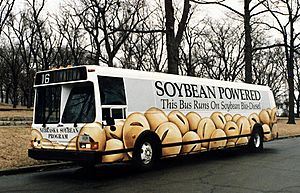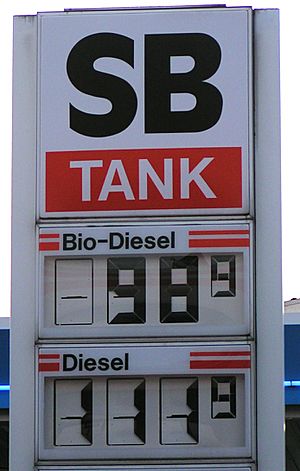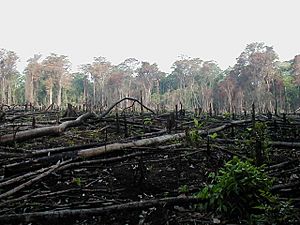Vegetable oils as alternative energy facts for kids
Vegetable oils are becoming a popular choice to replace fossil fuels. These oils are the main ingredient for biodiesel, which works much like regular diesel. Some special mixes of vegetable oil can be used in cars without changing them. However, using straight vegetable oil often needs cars that are set up to heat the oil. This heating makes the oil thinner and easier to use.
Scientists are also looking into growing biofuel from algae. This could be a big step for future fuels. But there are some worries about using land to grow fuel crops instead of food. People are also thinking about how growing lots of crops for fuel might affect the environment.
Contents
- Why We Need New Energy Sources
- How Vegetable Oil Helps the Environment
- Is Vegetable Oil Safe?
- How Vegetable Oil Stores Energy
- Different Kinds of Vegetable Oil for Fuel
- Vegetable Oil for Transportation
- Vegetable Oil for Making Electricity
- Cost of Vegetable Oil Fuel
- Can We Make Enough Vegetable Oil?
- Environmental Concerns
- Food vs. Fuel Debate
- Algae for Making Vegetable Oil
Why We Need New Energy Sources
Our Earth has a limited amount of fossil fuels. Right now, most of the world's energy for cars and making electricity comes from these fuels. Experts believe that soon, we will start running out of oil. This means our economy will need to switch to alternative fuels.
Fossil fuels have solved two big problems: giving us energy and storing it. Vegetable oil can do both! Other energy ideas for the future include:
|
|
How Vegetable Oil Helps the Environment
Plants use sunlight and a process called photosynthesis to take carbon dioxide (CO2) out of the air. They use this CO2 to grow and make vegetable oil. When this oil is burned in an engine, the same amount of CO2 goes back into the air.
This means vegetable oil does not add new CO2 to the atmosphere. It helps fight the problem of greenhouse gases. It's like catching and storing solar energy, making it a renewable energy source.
Is Vegetable Oil Safe?
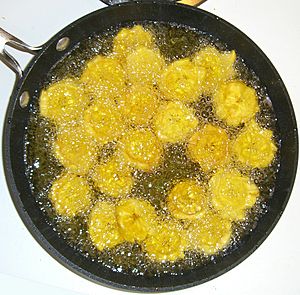
Vegetable oil is much safer than fuels like gasoline or regular diesel. It is also much harder to accidentally set on fire because it needs a very high temperature (around 275-290 °C) to burn. Some types of vegetable oil are even safe to eat!
How Vegetable Oil Stores Energy
Some energy technologies, like hydrogen or batteries, are good for storing energy. But they don't create the energy themselves. Other technologies, like nuclear or solar power, create energy but don't store it easily.
Vegetable oil is special because it can both create and store energy. It's also much lighter and cheaper to store a certain amount of energy as vegetable oil compared to many other fossil fuel replacements.
Different Kinds of Vegetable Oil for Fuel
Many different kinds of vegetable oils can be used for fuel. The article List of vegetable oils tells you which ones are used and where they are grown.
Vegetable Oil for Transportation
Vegetable oil can be used in vehicles in a few ways:
- Vegetable oil blends: Mixing vegetable oil with regular diesel fuel can give some benefits without changing the car.
- Biodiesel: This fuel is made from vegetable oil through a process called transesterification. Biodiesel burns just like regular diesel and works in any diesel engine. Its name simply means it comes from vegetable oil.
- Straight vegetable oil: This works in diesel engines if it's heated first. Some engines already heat their fuel, while others need a small electric heater. How well it works depends on the heating system, the engine, the type of oil (thinner oils are easier), and the weather (warmer is easier). Some companies like Deutz and John Deere are working on engines that can use straight vegetable oil.
- Vegetable oil refining: Vegetable oil can be sent to an oil refinery. There, it can be changed into gasoline, diesel, or propane using special chemical processes. Some examples of this are NExBTL and H-Bio.
Using biodiesel or vegetable oil blends can be an easy first step because they don't need big changes to cars. Later, if cars are made to run on straight vegetable oil and it's sold at gas stations, people might choose it to save money.
Vegetable Oil for Making Electricity
Other ways to make electricity, like nuclear power, fusion power, wind power, and solar power, might be cheaper. So, vegetable oil might only be used in smaller power plants or during times when a lot of electricity is needed quickly. There is at least one 5-megawatt power plant that runs on biodiesel. Companies like MAN B&W Diesel and Wärtsilä make engines for power plants that can use pure plant oil.
Cost of Vegetable Oil Fuel
In some places, like Europe, straight vegetable oil can cost more than regular diesel at the supermarket. However, if you buy it in large amounts directly from the people who make it, it can be cheaper. In the USA, the cost of vegetable oil can be similar to or more than diesel.
The amount of biodiesel used around the world is growing. For example, in Germany, biodiesel makes up 3% of the diesel market and is the most popular alternative fuel. The German government hopes to reach 10% biofuels by 2010.
From 2005 to 2007, the price of many vegetable oils doubled. This increase was mostly because more people wanted to use them for fuel. A big part of the price you pay for fuel at the pump is fuel tax. If you buy vegetable oil from a grocery store, it doesn't have these high taxes. This is why some people used to buy cooking oil for their cars, even though it was against the law because they weren't paying fuel tax.
Since vegetable oil (even as biodiesel) doesn't add to greenhouse gases, governments might tax it less than gasoline. This could help countries reach their Kyoto Protocol goals to reduce pollution.
Can We Make Enough Vegetable Oil?
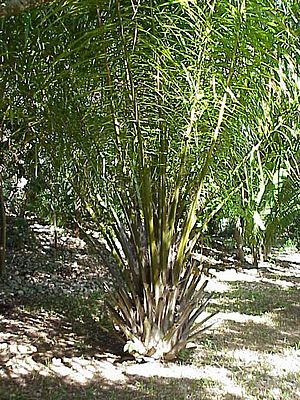
In 2008/09, the world was expected to produce 418 million tonnes of vegetable oil seeds. After pressing, this would make 131 million tonnes of vegetable oil. A lot of this comes from Oil Palms, and palm oil production is growing fast.
In 2004, the US used a huge amount of gasoline and diesel. To replace all that fuel with vegetable oil would need a very large area of land for growing crops.
An expert from the FAO (Food and Agriculture Organization) said that biofuels could provide 25% of the world's energy needs in the next 15 to 20 years. This is good for reducing greenhouse gases.
Growing algae could produce much more oil from a smaller area. Early tests with algae grown using CO2 from power plants look promising. Also, changing plants through genetic modification can help them produce more oil. For example, soybean yields have more than doubled from 1979 to 2005.
Environmental Concerns
There are worries that the growing demand for vegetable oil is leading to deforestation. This means old forests are being cut down and replaced with oil palm trees. When land is cleared, it's often burned, which releases a lot of CO2, a greenhouse gas. If we want to replace all gasoline and diesel with vegetable oil using today's methods, it would have a big environmental impact.
Food vs. Fuel Debate
The rising price of vegetable oil is causing problems in some poorer countries. Some people argue that using food crops for fuel creates a competition between feeding people in poor countries and fueling cars in rich countries.
Some suggest that fuel should only be made from vegetable oils that people don't eat, like jatropha oil. These plants can grow on land that isn't good for food crops. For example, trees like Millettia Pinnata or Moringa oleifera can grow on poor land and don't need much care after a few years. They also help the soil and can provide income for rural areas. These trees have deep roots that don't compete with food crops, and some can even grow with very little rainfall.
Algae for Making Vegetable Oil
Some types of algae can contain as much as 50% vegetable oil! Algae grow much faster than regular plants used for oil. This means algae could produce a lot more oil from a smaller area of land. Using algae could lead to less deforestation and less competition for land used to grow food.
One expert said that making biodiesel from microalgae (tiny algae) is possible. It's the only renewable biodiesel that could completely replace fuels made from petroleum. The cost of making algae biodiesel needs to come down, but it seems like it's possible.
Algae need a lot of CO2 to grow. If you get CO2 from power plant smokestacks, it's already clean and easy to use. This makes algaculture much simpler. Governments might even give companies a reason to use CO2 from smokestacks to help reduce pollution.
There's a lot of research happening in this area. As of 2007, no vegetable oil from algae was being sold as fuel. However, big companies like ExxonMobil are investing a lot of money and expect to start producing it in 5 to 10 years. In 2012, President Obama also supported the idea of getting oil from algae.
|
 | Sharif Bey |
 | Hale Woodruff |
 | Richmond Barthé |
 | Purvis Young |


